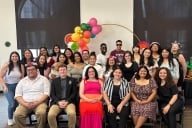You have /5 articles left.
Sign up for a free account or log in.
WASHINGTON -- In a speech to presidents, chancellors and leaders of historically black colleges and universities, a Georgia congressman told them what has already been widely acknowledged -- that their institutions historically have been slow to support lesbian, gay, bisexual and transgender youth.
The message from Representative Henry Johnson, a Democrat, was not a critical one, nor a rebuke, but a call for campus culture at HBCUs to improve for these students, to stamp out homophobia and develop resources for them.
Administrators attending the event where Johnson spoke Wednesday, the first-ever HBCU summit organized by the largest and most influential LGBTQ lobbying group, the Human Rights Campaign, said in interviews they agreed. Though their institutions to some degree have adopted pro-LGBTQ initiatives, which is why they were asked to Washington, they said continuing to do more is critical. Those historically black colleges not invited hadn't pushed much for their gay students, participants said.
Human Rights Campaign’s strategy is this: invite and pay for the leaders from the larger and more progressive of the historically black institutions to fly here, and sit them down for a daylong discussion of the benefit of LGBTQ-inclusive practices, said Leslie Hall, manager of the HBCU project for the Human Rights Campaign.
Sixteen representatives from HBCUs attended out of the close to 50 that were invited -- historically black institutions number a little more than 100. Hall picked colleges and universities with bigger student populations, but also in conservative-leaning states with perhaps unfriendly laws toward the LGBTQ community.
Hall’s hope is that the institution’s leaders who came Wednesday would model for the smaller, more old-school colleges and universities and nudge them toward inclusive measures. HRC spent roughly $15,000 on expenses for the event, including lodging, food and travel.
Hall has visited many of the HBCU campuses and said he’s found people dedicated to improving policies and the climate for LGBTQ students, but said they been tangled up in red tape -- they are willing but need to convince the presidents and governing boards.
LGBTQ students at HBCUs often seek more mental health resources in the guidance centers, said Hall, or complain frequently about requests for funding for queer student groups being rejected.
“It was important for me to shoot right for the top and bring these leaders here,” Hall said. “We are very serious that these leaders know this an important investment they need to make and expand on their campuses.”
Historically black institutions haven’t always supported the LGBTQ cause wholeheartedly, or at least have made missteps in the community. Morehouse College, an all-men’s institution, adopted a dress code in 2009 forbidding women’s clothing, which gay men on campus called a slight. And in 2007 Hampton University refused recognition for a student group there that promoted an alliance between straight students and the LGBTQ population.
About 30 percent of HBCUs have LGBTQ clubs affiliated with the universities, and only three have designated a full-time position for support of LGBTQ students -- Bowie State University, Fayetteville State University and North Carolina Central University.
Though many of the institutions in the more urban areas have dedicated space for gender-neutral bathrooms -- or, in Fayetteville State’s case, an LGBTQ center that the chancellor created by shutting down one of the dormitories -- a cultural shift is required, said Walter Kimbrough, president of Dillard University.
Kimbrough pointed out that many predominantly white institutions maintain spaces just for black students, but that doesn’t necessarily make them “inclusive.”
“If we aren’t dealing with the culture, these strategies of just spaces, policies, they don’t mean a thing. We have to figure out how we’re going to make a bigger engagement in changing the culture on campus. That’s what I wrestle with in mind,” he said.
At Fayetteville, Chancellor James Anderson made a public speech about changing the university’s “brand” -- it would preserve its legacy as a traditionally black institution but embrace more inclusive values. In this way, Anderson “got out in front” of more conservative alumni who might chastise him, and he could compel them to explain why the university shouldn’t be more accepting.
If the Human Rights Campaign plan doesn’t make headway, it will appeal to other institutions’ business sensibilities, Hall said -- all institutions are concerned about enrollment and graduates' ability to find jobs, both of which can be affected by negative publicity about not supporting LGBTQ students.
Traditionally, HBCUs have mulled whether their graduates will be accepted into the working world because they are people of color, said Michael Lomax, the president and chief executive officer of the United Negro College Fund, a philanthropic group representing more than 37 private black colleges and universities.
In a session with JPMorgan Chase, a representative from the banking behemoth told leaders that graduates with experience in diversity issues are valued more, Lomax said.
“That really is a kind of different thinking for historically black colleges,” Lomax said. “I think the other issue we’re challenged now to think about is if our graduates are bringing experience and the kind of proficiency in terms of diversity and inclusion in their own behaviors and outlooks.”








